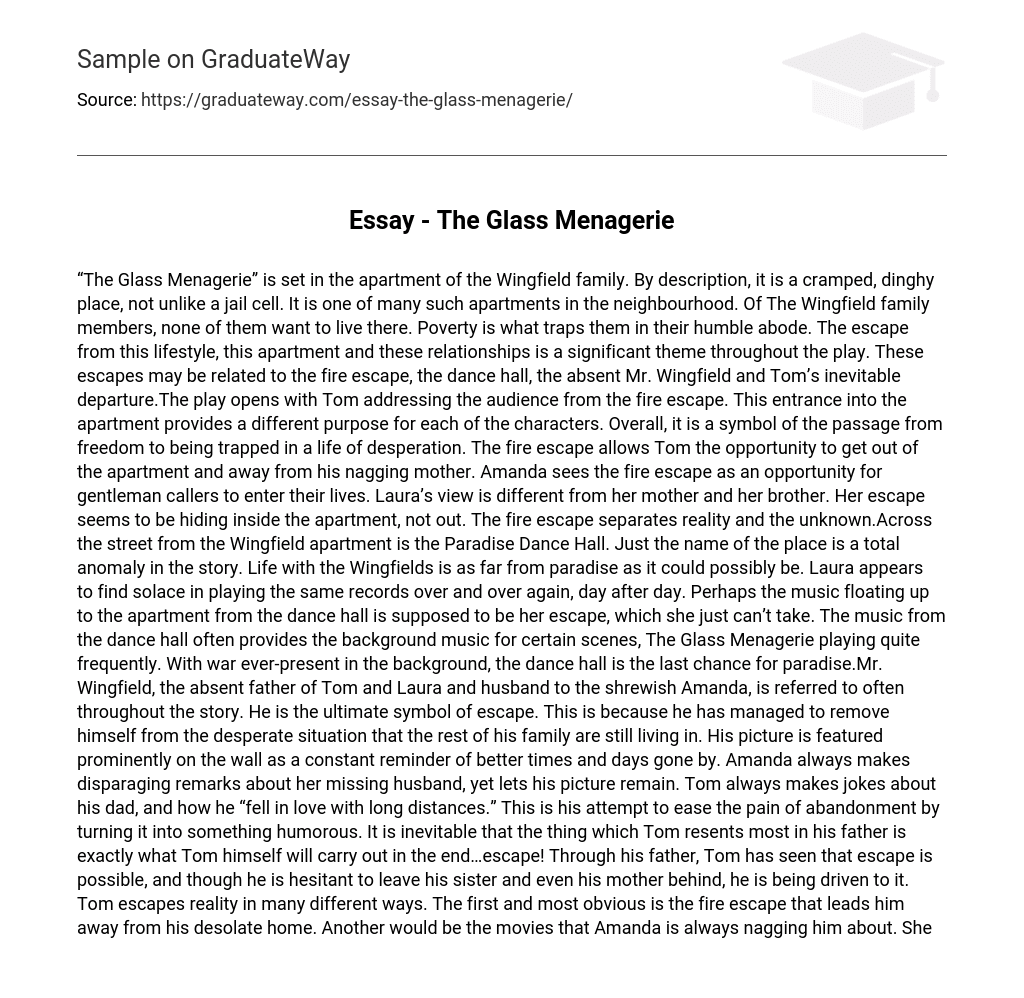“The Glass Menagerie” takes place in the Wingfield family’s apartment, which is described as a cramped and dingy space, comparable to a jail cell.
Among the various apartments in the neighborhood, this is just one of them. All members of the Wingfield family have no desire to reside in this particular apartment. Their poverty is what confines them to their modest dwelling. The play consistently explores the theme of longing for freedom from this lifestyle, this apartment, and these relationships.
These escapes may be associated with the fire escape, the dance hall, and the absence of Mr. Wingfield and Tom’s upcoming departure. At the beginning of the play, Tom speaks to the audience from the fire escape, which serves a different purpose for each character. In general, it symbolizes the transition from freedom to being trapped in a desperate life. For Tom, the fire escape offers a chance to escape the apartment and his mother’s constant nagging. Amanda views the fire escape as an opportunity for potential suitors to enter their lives.
Laura holds a contrasting perspective compared to her mother and brother; she finds solace in staying inside the apartment rather than venturing out. The fire escape serves as a boundary between the familiar and the unfamiliar. Situated across from the Wingfield residence is the Paradise Dance Hall, a name that starkly contrasts the unfortunate reality of life with the Wingfields.
Laura finds solace in repeatedly playing the same records, day after day. The music from the dance hall, which floats up to her apartment, seems to be her way of escaping, although she is unable to do so. This music frequently serves as the background for certain scenes, particularly in The Glass Menagerie. The dance hall, being the last chance for paradise, is a reminder of the constant presence of war. Mr. Wingfield, Tom and Laura’s absent father and Amanda’s unpleasant husband, is consistently mentioned throughout the story as the ultimate symbol of escape.
The reason for this is that he has managed to distance himself from the desperate situation that the rest of his family still find themselves in. A constant reminder of better times and past days, his picture is prominently featured on the wall. Amanda consistently makes negative comments about her husband who is missing but still allows his picture to remain. Tom frequently jokes about his father, mocking how he “fell in love with long distances.” This is his way of trying to lighten the pain of being abandoned by making it into something funny. It is certain that the very thing Tom despises most about his father is ultimately what Tom himself will do… escape! By observing his father, Tom has learned that escaping is possible. Although he hesitates to leave his sister and even his mother behind, he feels compelled to do so.
Tom seeks various means to avoid reality. One method is by using the fire escape to flee his desolate home. Another involves watching movies, which Amanda constantly nags him about. She believes he should dedicate less time to movies and instead focus on work and helping Laura find a suitable companion.
The greater Amanda incessantly pesters, the more Tom craves his movie getaways, transporting him to an alternate realm where mothers, sisters, and absent fathers are nonexistent. As the tension escalates, his movie consumption and drinking intensify. Evading reality becomes increasingly challenging for Tom. The moment to fully escape reality is rapidly approaching. Amanda ultimately pushes him to his breaking point, almost coercing him to leave but not before burdening him with overwhelming guilt trips.
Tom’s departure does not bring him the desired escape, as he feels overwhelmed with guilt for leaving Laura. He cannot seem to move on from this feeling, as everything he encounters reminds him of her. Tom is now realizing that departing is not a form of escape, but rather a path towards greater desperation, similar to his father. In “The Glass Menagerie”, Williams incorporates the theme of escape to depict the hopelessness and futility present in each character’s aspirations.
Tom, Laura, and Amanda all share the mistaken belief that escape is possible. However, none of the characters succeed in completely freeing themselves from their current circumstances. The idea of escape is symbolized through the fire escape, the dance hall, Mr. Wingfield, and Tom’s departure. In multiple ways, this theme of escape proves to be a hopeless endeavor. It could be said that Tennessee Williams is attempting to convey the message that avoiding life’s challenges through running away is not a viable solution.
The only way to escape in life is by solving your problems, rather than avoiding them.





